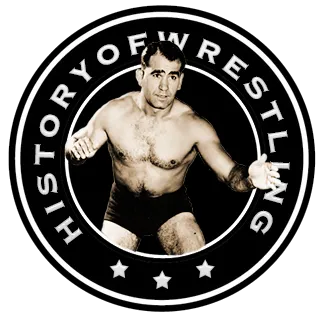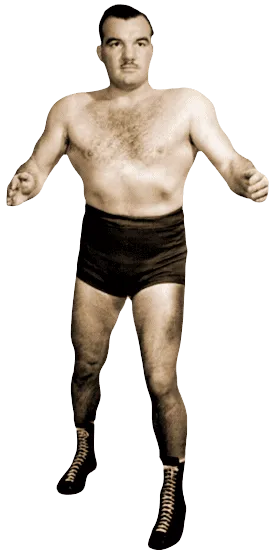by Stephen Von Slagle
For over thirty years, “Whipper” Billy Watson was one of professional wrestling’s premier attractions and during his time in the sport he thrilled crowds like few others. Never one to rely on a flashy gimmick, “Whipper” Watson (like most other great NWA champions) simply got in the ring and wrestled, very well. With a man as talented as Watson giving his all during each match, no gimmick was needed, just his impressive repertoire of holds and counter-holds. His natural talent combined with an exceptional level of popularity among the public, particularly in his native Canada, resulted in several World Heavyweight title reigns for Watson, as well as one of the most successful and respected careers in the history of the sport.
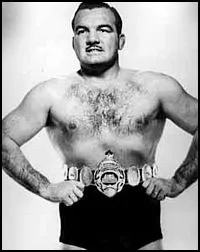 “Whipper” Billy Watson was born William Potts on June 25, 1915 in East York, Ontario and began his professional wrestling career in 1936, competing in the rugged rings of England. After gaining several years of experience in Europe, he returned to his native Canada, where he picked up his “Whipper” nickname (Watson was also known as “The Irish Whip”). After sending his opponent into the ring ropes, he would then deliver a high back body drop — a maneuver that would become synonymous with Watson, as well as a spot used in virtually every match in the post-Watson era of modern pro wrestling.
“Whipper” Billy Watson was born William Potts on June 25, 1915 in East York, Ontario and began his professional wrestling career in 1936, competing in the rugged rings of England. After gaining several years of experience in Europe, he returned to his native Canada, where he picked up his “Whipper” nickname (Watson was also known as “The Irish Whip”). After sending his opponent into the ring ropes, he would then deliver a high back body drop — a maneuver that would become synonymous with Watson, as well as a spot used in virtually every match in the post-Watson era of modern pro wrestling.
“Whipper” Watson was a career-long babyface and a role model during his many years at the top of the sport. It was both a responsibility and an honor for Watson, who openly embraced the role. For instance, Watson took an active part in fundraising for the Easter Seals, the Multiple Sclerosis Society, various organizations for handicapped children, and the Boy Scouts of America. While his philanthropic activities were not done in order to secure public accolades, Watson was nevertheless the recipient of several awards, including the prestigious Order of Canada in 1984. The April 1944 edition of Maclean’s Magazine described Watson as being “…the living embodiment of all the ideals of the Boy Scout movement and the Legion of Decency. Watson is as handsome as Robert Taylor, as powerful as the SS Queen Mary and as persistent and uncompromising as Dick Tracy in his efforts to exterminate evil. In moments of supreme exasperation he is likely to mutter ‘Oh, fudge!’ but otherwise his conduct is exemplary. He is a paragon of virtue in the ring. If his opponent attempts to decapitate him with a tomahawk, misses and imbeds the tomahawk in one of the ring posts, Watson will help him to disengage the weapon. If his opponent strikes him illegally with a brass knuckle, Watson merely will smile a sad, brave smile and break his opponent in twain, like a stick of dry macaroni. Watson destroys his opponents with the air of Sir Galahad repelling scorpions and the customers love him to pieces.”
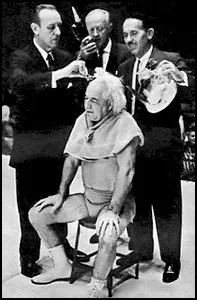 The character traits of “Gorgeous” George, on the other hand, were the total opposite of the virtuous Watson and the two wrestling superstars had a long and intense feud throughout the 1950s. Using the new medium of television to transmit their battles across the nation, Watson and George combined for a match that headlined sold-out cards across Canada and the United States. Their classic feud finally culminated in a 1959 “Hair vs. Hair” showdown in Toronto’s Maple Leaf Gardens, which saw Watson defeat George in a match that set record Canadian TV ratings and drew a live crowd of over 15,000. Watson won the highly-publicized bout, and as a result, the “Human Orchid” was forced — to the delight of the nation — to allow his golden locks to be shaved until his head was completely bald. The victorious Watson, by forcing the hated George to suffer the ultimate humiliation, was the object of untold praise and adoration.
The character traits of “Gorgeous” George, on the other hand, were the total opposite of the virtuous Watson and the two wrestling superstars had a long and intense feud throughout the 1950s. Using the new medium of television to transmit their battles across the nation, Watson and George combined for a match that headlined sold-out cards across Canada and the United States. Their classic feud finally culminated in a 1959 “Hair vs. Hair” showdown in Toronto’s Maple Leaf Gardens, which saw Watson defeat George in a match that set record Canadian TV ratings and drew a live crowd of over 15,000. Watson won the highly-publicized bout, and as a result, the “Human Orchid” was forced — to the delight of the nation — to allow his golden locks to be shaved until his head was completely bald. The victorious Watson, by forcing the hated George to suffer the ultimate humiliation, was the object of untold praise and adoration.
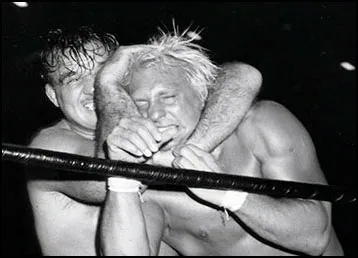 “Whipper” Watson won the two most prestigious versions of the World Heavyweight title during his career. The first came on February 21, 1947, when “The Whipper” defeated “Wild” Bill Longson for the National Wrestling Association World Heavyweight championship, which he would eventually lose to “friendly rival” Lou Thesz. Watson went on to avenge that loss nine years later, though, when he defeated Thesz in Toronto for the National Wrestling Alliance World Heavyweight title on March 15, 1956. The man that promoter Jack Tunney once called “the greatest wrestler I ever saw…clean, methodical, no crazy antics” went on to establish himself as an elite NWA World champion, despite holding the title for less than a year. Although he would lose the World championship back to Thesz on November 9, 1956 in St. Louis, Watson remained one of the most high-profile workers in the business for many more years to come.
“Whipper” Watson won the two most prestigious versions of the World Heavyweight title during his career. The first came on February 21, 1947, when “The Whipper” defeated “Wild” Bill Longson for the National Wrestling Association World Heavyweight championship, which he would eventually lose to “friendly rival” Lou Thesz. Watson went on to avenge that loss nine years later, though, when he defeated Thesz in Toronto for the National Wrestling Alliance World Heavyweight title on March 15, 1956. The man that promoter Jack Tunney once called “the greatest wrestler I ever saw…clean, methodical, no crazy antics” went on to establish himself as an elite NWA World champion, despite holding the title for less than a year. Although he would lose the World championship back to Thesz on November 9, 1956 in St. Louis, Watson remained one of the most high-profile workers in the business for many more years to come.
In addition to winning various regional titles, which included the Stampede Canadian Heavyweight title and a record nine NWA British Commonwealth championships, Watson was also a prolific tag team champion, capturing the NWA Canadian Open tag team championship no less than twelve times with partners such as Tex McKenzie, Antonino Rocca, Pat O’Connor, Bobo Brazil, and Yukon Eric among others. Additionally, Watson, a popular fixture on television and a top draw for numerous promoters, won the NWA International Tag Team championship on nine occasions with partners Bruno Sammartino, Mark Lewin, Johnny Valentine, and “Bulldog” Brower to name a few.
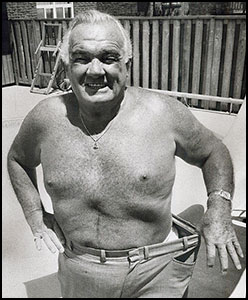 But in 1971, tragedy struck Bill Potts when he was hit by a car that was travelling on an icy road. The car slammed into Watson, pinning him against another vehicle and crushing his knee, nearly severing his leg in the process. Retirement was his only option when it came to pro wrestling and he gracefully left the sport after a memorable 35-year career. Following the accident, Watson spent the next twenty years using his name and influence to help others, working tirelessly for numerous charities, both in his native Canada as well as in his second home of the United States. Al Fraser, the executive director of the Multiple Sclerosis Foundation once said of Watson, “He made people feel better just being around him. He had that magical effect.”
But in 1971, tragedy struck Bill Potts when he was hit by a car that was travelling on an icy road. The car slammed into Watson, pinning him against another vehicle and crushing his knee, nearly severing his leg in the process. Retirement was his only option when it came to pro wrestling and he gracefully left the sport after a memorable 35-year career. Following the accident, Watson spent the next twenty years using his name and influence to help others, working tirelessly for numerous charities, both in his native Canada as well as in his second home of the United States. Al Fraser, the executive director of the Multiple Sclerosis Foundation once said of Watson, “He made people feel better just being around him. He had that magical effect.”
“Whipper” Watson is a member of the Stampede Wrestling Hall of Fame (1995), the Wrestling Observer Newsletter Hall of Fame (1996), and the Professional Wrestling Hall of Fame (2015).
On February 4, 1990 William “Whipper Watson” Potts, 74, died after suffering a heart attack at his winter home in Florida.
